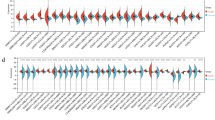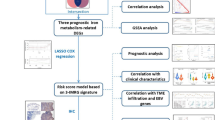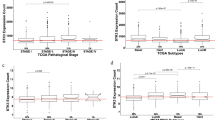Abstract
Purpose
The transcription factor IRF4 regulates immunoglobulin class switch recombination as well as plasma cell differentiation. We examined the prognostic significance of IRF4 expression in node-negative breast cancer (BC).
Methods
IRF4 expression was evaluated by immunostaining in a cohort of 197 node-negative BC patients not treated in adjuvant setting, referred to as Mainz cohort. The prognostic significance of immunohistochemically determined IRF4 expression for metastasis-free survival (MFS) was examined by Kaplan–Meier survival analysis as well as univariate and multivariate Cox analysis adjusted for age, pT stage, histological grade, ER, and HER2 status. For verification of immunohistochemical results, IRF4 mRNA expression was evaluated using microarray-based gene expression profiling in four previously published cohorts (Mainz, Rotterdam, Transbig, Yu) consisting of 824 node-negative breast cancer patients in total, who were not treated with adjuvant therapy. The prognostic significance of IRF4 mRNA expression on metastasis-free survival (MFS) was examined by univariate and multivariate Cox analysis in the Mainz cohort and by a meta-analysis of all node-negative BC patients and different molecular subtypes. IRF4 mRNA levels were compared to immunohistochemically determined IRF4 expression in 140 patients of the Mainz cohort using Spearman correlation.
Results
Immunohistochemically determined high IRF4 expression was associated with higher MFS in univariate Cox regression (HR 0.178, 95% CI 0.070–0.453, p < 0.001). IRF4 maintained its significance independently of established clinical factors for MFS (HR 0.088, 95% CI 0.033–0.232, p < 0.001). Immunohistochemically, determined IRF4 correlated moderately with IRF4 mRNA expression (ρ = 0.589). Higher expression of IRF4 was associated with better MFS in a meta-analysis of the total cohort (HR 0.438, 95% CI 0.307–0.623, p < 0.001). Prognostic significance was more pronounced in the HER2+ molecular subtype (HR 0.215, 95% CI 0.090–0.515, p = 0.001) as compared to the luminal A (HR 0.549, 95% CI 0.248–1.215, p = 0.139), luminal B (HR 0.444, 95% CI 0.215–0.916, p = 0.028), and basal-like subtypes (HR 0.487, 95% CI 0.269–0.883, p = 0.018). Further, IRF4 expression showed independent prognostic significance in a multivariate analysis of the Mainz cohort (HR 0.236, 95% CI 0.105–0.527, p < 0.001).
Conclusions
IRF4 had independent prognostic significance in node-negative BC. Higher expression of IRF4 was associated with improved outcome. The prognostic impact differed between diverse molecular subtypes and was most pronounced in HER2+ breast cancer.






Similar content being viewed by others
References
Adams S, Gray RJ, Demaria S, Goldstein L, Perez EA, Shulman LN, Martino S, Wang M, Jones VE, Saphner TJ, Wolff AC, Wood WC, Davidson NE, Sledge GW, Sparano JA, Badve SS (2014) Prognostic value of tumor-infiltrating lymphocytes in triple-negative breast cancers from two phase III randomized adjuvant breast cancer trials: ECOG 2197 and ECOG 1199. J Clin Oncol 32(27):2959–2966
Chang CC, Lorek J, Sabath DE, Li Y et al (2002) IRF4 correlates with clinical outcome in patients with B-cell chronic lymphocytic leukemia. Blood 100(13):4671–4675
Chen Z, Gerhold-Ay A, Gebhard S, Boehm D, Solbach C, Lebrecht A, Battista M, Sicking I, Cotarelo C, Cadenas C, Marchan R, Stewart JD, Gehrmann M, Koelbl H, Hengstler JG, Schmidt M (2012) Immunoglobulin kappa C predicts overall survival in node-negative breast cancer. PLoS ONE 7(9): e44741
Denkert C, Loibl S, Noske A, Roller M, Muller BM, Komor M, Budczies J, Darb-Esfahani S, Kronenwett R, Hanusch C, von Torne C, Weichert W, Engels K, Solbach C, Schrader I, Dietel M, von Minckwitz G (2010) Tumor-associated lymphocytes as an independent predictor of response to neoadjuvant chemotherapy in breast cancer. J Clin Oncol 28(1):105–113
Denkert C, von Minckwitz G, Brase JC, Sinn BV, Gade S, Kronenwett R, Pfitzner BM, Salat C, Loi S, Schmitt WD, Schem C, Fisch K, Darb-Esfahani S, Mehta K, Sotiriou C, Wienert S, Klare P, Andre F, Klauschen F, Blohmer JU, Krappmann K, Schmidt M, Tesch H, Kummel S, Sinn P, Jackisch C, Dietel M, Reimer T, Untch M, Loibl S (2015) Tumor-infiltrating lymphocytes and response to neoadjuvant chemotherapy with or without carboplatin in human epidermal growth factor receptor 2-positive and triple-negative primary breast cancers. J Clin Oncol 33(9):983–991
Fremd C, Schuetz F, Sohn C, Beckhove P, Domschke C (2013) B cell-regulated immune responses in tumor models and cancer patients. Oncoimmunology 2(7): e25443
Gajewski TF, Schreiber H, Fu YX (2013) Innate and adaptive immune cells in the tumor microenvironment. Nat Immunol 14(10):1014–1022
Iglesia MD, Parker JS, Hoadley KA, Serody JS, Perou CM, Vincent BG (2016) Genomic analysis of immune cell infiltrates across 11 tumor types. J Natl Cancer Inst 108(11):djw144
Kakimi K, Karasaki T, Matsushita H, Sugie T (2016) Advances in personalized cancer immunotherapy. Breast Cancer 24(1):16–24. doi:10.1007/s12282-016-0688-1
Loi S, Sirtaine N, Piette F, Salgado R, Viale G, Van Eenoo F, Rouas G, Francis P, Crown JP, Hitre E, de Azambuja E, Quinaux E, Di Leo A, Michiels S, Piccart MJ, Sotiriou C (2013) Prognostic and predictive value of tumor-infiltrating lymphocytes in a phase III randomized adjuvant breast cancer trial in node-positive breast cancer comparing the addition of docetaxel to doxorubicin with doxorubicin-based chemotherapy: BIG 02–98. J Clin Oncol 31(7):860–867
Mahmoud SM, Lee AH, Paish EC, Macmillan RD, Ellis IO, Green AR (2012) The prognostic significance of B lymphocytes in invasive carcinoma of the breast. Breast Cancer Res Treat 132(2):545–553
Mazel M, Jacot W, Pantel K, Bartkowiak K, Topart D, Cayrefourcq L, Rossille D, Maudelonde T, Fest T, Alix-Panabieres C (2015) Frequent expression of PD-L1 on circulating breast cancer cells. Mol Oncol 9(9):1773–1782
Olkhanud PB, Damdinsuren B, Bodogai M, Gress RE, Sen R, Wejksza K, Malchinkhuu E, Wersto RP, Biragyn A (2011) Tumor-evoked regulatory B cells promote breast cancer metastasis by converting resting CD4(+) T cells to T-regulatory cells. Cancer Res 71(10):3505–3515
Rody A, Holtrich U, Pusztai L, Liedtke C, Gaetje R, Ruckhaeberle E, Solbach C, Hanker L, Ahr A, Metzler D, Engels K, Karn T, Kaufmann M (2009) T-cell metagene predicts a favorable prognosis in estrogen receptor-negative and HER2-positive breast cancers. Breast Cancer Res 11(2):R15
Rosenblatt J, Zhang YD, Tadmor T (2007) Inhibition of antitumor immunity by B cells. Cancer Res 67(10):5058–5059 (author reply 5059)
Salgado R, Denkert C, Demaria S, Sirtaine N, Klauschen F, Pruneri G, Wienert S, Van den Eynden G, Baehner FL, Penault-Llorca F, Perez EA, Thompson EA, Symmans WF, Richardson AL, Brock J, Criscitiello C, Bailey H, Ignatiadis M, Floris G, Sparano J, Kos Z, Nielsen T, Rimm DL, Allison KH, Reis-Filho JS, Loibl S, Sotiriou C, Viale G, Badve S, Adams S, Willard-Gallo K, Loi S (2015) The evaluation of tumor-infiltrating lymphocytes (TILs) in breast cancer: recommendations by an International TILs Working Group 2014. Ann Oncol 26(2):259–271
Schmidt M, Bohm D, von Torne C, Steiner E, Puhl A, Pilch H, Lehr HA, Hengstler JG, Kolbl H, Gehrmann M (2008) The humoral immune system has a key prognostic impact in node-negative breast cancer. Cancer Res 68(13):5405–5413
Schmidt M, Petry I, Böhm D, Lebrecht A, Törne C, Gebhard S (2011) Ep-CAM RNA expression predicts metastasis-free survival in three cohorts of untreated node-negative breast cancer. Breast Cancer Res Treat 125(3):647–650
Schmidt M, Hellwig B, Hammad S, Othman A, Lohr M, Chen Z, Boehm D, Gebhard S, Petry I, Lebrecht A, Cadenas C, Marchan R, Stewart JD, Solbach C, Holmberg L, Edlund K, Kultima HG, Rody A, Berglund A, Lambe M, Isaksson A, Botling J, Karn T, Muller V, Gerhold-Ay A, Cotarelo C, Sebastian M, Kronenwett R, Bojar H, Lehr HA, Sahin U, Koelbl H, Gehrmann M, Micke P, Rahnenfuhrer J, Hengstler JG (2012) A comprehensive analysis of human gene expression profiles identifies stromal immunoglobulin kappa C as a compatible prognostic marker in human solid tumors. Clin Cancer Res 18(9):2695–2703
Schumacher T, Schreiber RD (2015) Neoantigens in cancer immunotherapy. Science 348(6230):69–74
Seo AN, Lee HJ, Kim EJ, Kim HJ, Jang MH, Lee HE, Kim YJ, Kim JH, Park SY (2013) Tumour-infiltrating CD8 + lymphocytes as an independent predictive factor for pathological complete response to primary systemic therapy in breast cancer. Br J Cancer 109(10):2705–2713
Shaffer AL, Emre NC, Romesser PB, Staudt LM (2009) IRF4: Immunity. Malignancy! Therapy? Clin Cancer Res 15(9):2954–2961
Varn FS, Mullins DW, Arias-Pulido H, Fiering S, Cheng C (2016) Adaptive immunity programmes in breast cancer. Immunology 150(1):25–34. doi:10.1111/imm.12664
Acknowledgements
Funding
This study was supported by the intramural research funding of the University Medical Center Mainz.
Author information
Authors and Affiliations
Corresponding author
Ethics declarations
Conflict of interest
The authors declare that they have no conflict of interest.
Ethical approval
The study was approved by the Research Ethics Committee of the University Medical Center Mainz, Germany.
Informed consent
Informed consent was obtained from all patients and all clinical investigations were conducted according to the ethical and legal standards.
Additional information
J. G. Hengstler and M. Schmidt shared senior-authorship.
Rights and permissions
About this article
Cite this article
Heimes, AS., Madjar, K., Edlund, K. et al. Prognostic significance of interferon regulating factor 4 (IRF4) in node-negative breast cancer. J Cancer Res Clin Oncol 143, 1123–1131 (2017). https://doi.org/10.1007/s00432-017-2377-7
Received:
Accepted:
Published:
Issue Date:
DOI: https://doi.org/10.1007/s00432-017-2377-7




